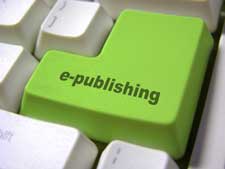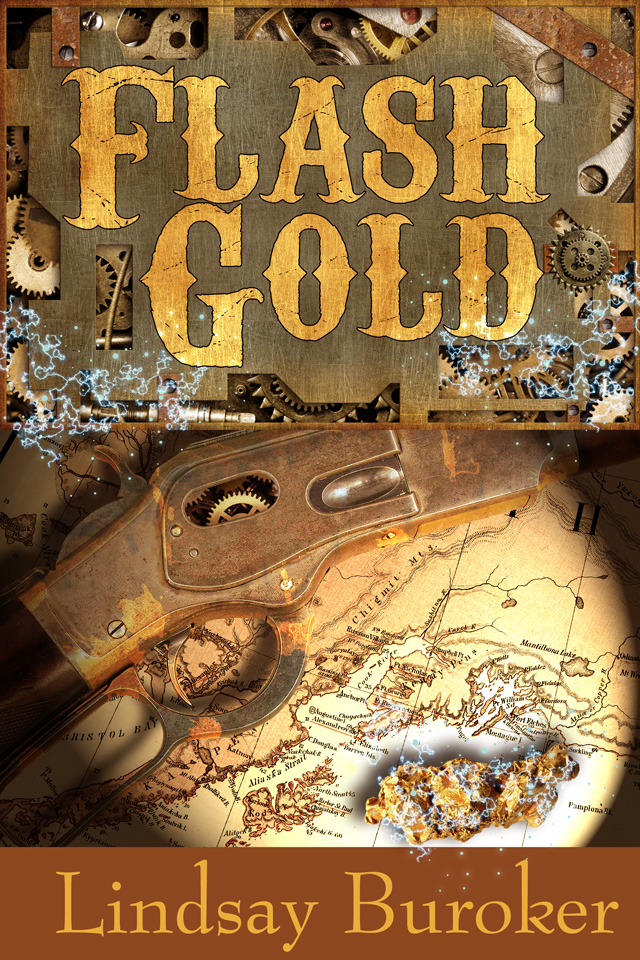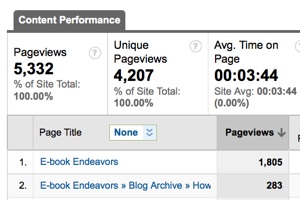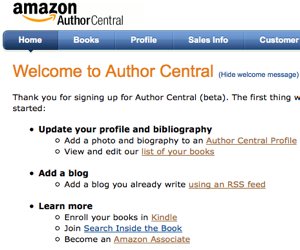 I’ve talked about the benefits of maintaining an author blog before, and also how many of us–myself included!–write to the wrong audience (fellow writers instead of the readers we want to attract) if our goal is to sell books. Heather Massey, the blogger at The Galaxy Express, is one of the few authors I’ve seen who’s doing it right.
I’ve talked about the benefits of maintaining an author blog before, and also how many of us–myself included!–write to the wrong audience (fellow writers instead of the readers we want to attract) if our goal is to sell books. Heather Massey, the blogger at The Galaxy Express, is one of the few authors I’ve seen who’s doing it right.
She started her blog, which focuses on science fiction romance, and built a popular audience long before her first SFR novel, Once Upon a Time in Space, came out. Thanks to her site, which is visited daily by loyal readers, you can bet she had people lining up to buy the book as soon as it was available.
Heather agreed to answer some questions for us today, so let’s get started!
Why don’t you give us the scoop on your book and on science fiction romance? It’s a genre I enjoy, and certainly one that’s come a long ways of late, but it does still seem like a fairly niche market.
Let’s start with the scoop on science fiction romance. In fact, this subgenre is like the ultimate banana split sundae. You have SF and romance—the bananas—anchoring a wide variety of stories with ooey-gooey fillings like space opera, cyberpunk, military, steampunk, and post-apocalyptic, and biopunk.
Add crunchalicious toppings like heroes and heroines who are scientists, cyborgs, starship captains, bounty hunters, soldiers, and space pirates, and you’ve got the making of a gastronomic masterpiece. Not that I’m biased or anything. 
Science fiction romance is indeed a niche market, but one with the staying power of Hercules. While romantic SF harks back to the 1930s, science fiction romance as a subgenre began as Star Trek fan fiction in the 1960s featuring stories about Mr. Spock in love.
In the mid-1980s, romance publishers began releasing science fiction romance, starting with Janelle Taylor’s MOONDUST AND MADNESS and Jayne Ann Krentz’s SWEET STARFIRE. Since then, science fiction romance evolved into a diverse subgenre released by mainstream print romance and SF publishers as well as by small press/digital publishers.
Science fiction romance’s niche status could very well change as ebooks capture an increasingly larger share of the market. Digital publishers like Samhain Publishing, Red Sage, and Carina Press, among others, are leading the charge in terms of getting science fiction romance ebooks into the hands of readers whether they are hardcore fans or newcomers. Readers have choices like never before, from short stories to novellas to novel-length books, and from stories with heat levels ranging from sweet to sizzling.
And now for the scoop about my debut erotic sci-fi romance, ONCE UPON A TIME IN SPACE (Red Sage Publishing). The premise goes a little something like this:
In the sea of stars, an epic love story is about to begin…
Earth is dying. Nick Venture, the last living descendant of Christopher Columbus, embarks on a dangerous mission to find a new planet and save humanity. This places him on a collision course with Raquel Donovan, the deadliest space pirate in the galaxy.
Raquel lives for one purpose: revenge against a horrible demon from her past. When an attempt to hijack Nick’s starship backfires, Raquel becomes his protector in order to avoid capture by the tyrannical Space Defense Corps. Nick and Raquel are irresistibly drawn to one another despite the forbidden nature of their attraction. But the conflicted pirate’s deepest secret could tear the couple apart even as humanity’s time runs out….
Sounds good! Unlike many of the visitors to my blog, you chose to sign on with a publisher rather than doing it indie style. Can you tell us about Red Sage Publishing and what they bring to the table?
For me, the value of a professionally edited story (whether by a freelance editor or one employed by a publisher), is priceless. In order to discover any and all leads on science fiction romance releases, I had been following a number of industry blogs including Edittorrent.
That blog was started by former Red Sage Senior Editor Theresa Stevens and current Red Sage Senior Editor Alicia Rasley. Their posts impressed me with Red Sage’s editing acumen. Also, they had once blogged about their interest in acquiring science fiction romance, and as my story had erotic elements, I decided to submit it. I’ve been absolutely thrilled with the experience.
Another factor is that Red Sage had the reputation and distribution channels that would help connect readers with my book. I simply couldn’t replicate that on my own. Finally, being familiar with the works of Red Sage authors like Nathalie Gray (FULL STEAM AHEAD) and Ellie Marvel (HEAT), I knew Red Sage wasn’t afraid to take risks with edgy science fiction romances. You can’t beat that kind of validation.
I first found out about you through your wonderful blog, The Galaxy Express. There’s just nothing else out there of this caliber in the SFR field. Can you tell us what prompted you to start it? Were you thinking of using it as a base to promote your own books later on, or did it begin out of love for the genre?
Thanks for your kind words about my blog. The basic history behind The Galaxy Express is that I’ve been a fan of SF-romance blends since my early teens. Unfortunately, I was never able to share my interest with very many people. And my day jobs over the years kept me pretty busy.
All of that changed with the birth of my daughter. I had the luxury of becoming a stay-at-home mom. That translated to extra time that I wanted to use for something fun, and that would channel some of my creative energy that had only manifested itself one other time, in a brief spurt of anime fan fiction (science fiction romance, of course!).
Around that same time, I discovered author Linnea Sinclair, whose books and promotional efforts were instrumental in raising the visibility of science fiction romance. Further research yielded the discovery of a few blogs devoted to the subgenre. Some were active, most others were not. Of the active ones, they seemed disconnected, like the proverbial ships passing in the night.
That alarmed me. Science fiction romance is my favorite subgenre and had been for decades. When I started The Galaxy Express, my goal was a selfish one. I wanted to talk about science fiction romance, period. I’d rarely had a chance to have conversations about it at a group level, never mind on the scale the Internet affords us.
Plus, I decided there was strength in numbers. If I could facilitate an entertaining gateway to all things science fiction romance, then the chances were strong that a bona fide community could develop. Basically, I saw a chance to help revitalize the subgenre and I took it.
One exciting aspect about blogging has been the opportunity to connect readers with a wide variety of books. The fact that one of them is now mine is a happy by-product. As I stated earlier, I had written some fan fiction for fun, and I had all kinds of stories in my head, but they were purely for my own entertainment.
I had thought of my book’s premise years before, but I kept hoping someone else would write it so I could read it, LOL! Mysteriously, no authors had the ability to read my mind, so I decided to start developing the story a little more. Then, a lot more. By the time I finished it, ebooks were a serious contender, so submitting to a small press/digital publisher was a no-brainer.
My occupational training was in another field entirely, so for a Muse to bite me this bad surprised me more than anyone.
I’ve seen some guest posts from you around the web. Do you find that’s a good way to build awareness of your blog and your book?
At the risk of sounding ridiculously clichéd, I have a lot of passion for science fiction romance. That passion meant above all that if anyone is going to read my words about science fiction romance, I owe them an entertaining time. If I had to juggle fifty purple hippos wearing lime green tutus and silver pasties while so engaged, then that was an effort I was willing to make.
That passion also empowered me to start relationships with like-minded readers, bloggers, and authors. Building awareness started with building relationships. My blog wouldn’t be where it is today without all of the incredible contributions from readers, bloggers, authors, and publishers.
Guest posts are a terrific way to build awareness, and especially so if they’re entertaining. Readers are busy people. They deserve posts that are fun, provocative, and informative. I strive to offer something fresh each time I have an opportunity to reach out to them.
Do you have any recommendations for authors who want to build a quality blog that attracts their target readers?
While each author’s path will be unique, I reflected upon some factors that folks could harness for a successful blog. In addition to providing entertaining entertainment and building relationships, consider the following:
* Find your niche—nay, your passion!
Presumably, you’ll blog about something you love so much that you’d be a puddle of tears without it. You’re not blogging about a topic/genre because you want to; you’re doing it because you can’t not blog about it. Have fun with it! Write posts in such a way that readers can’t look away. (Now you see where I’m going with this: I’m a poet and didn’t know it—huzzah!)
*Keep your blog’s focus consistent
In a way, a blog is like a brand. In order for readers to obtain a clear sense of the entertainment you’re offering, consistency is key. Once you decide on a topic, keep it pure.
* Commit to your endeavor fully.
Blogging is a lot of work—albeit fun work—and in order to be successful it requires a long-term commitment. I blog on average 3x weekly, and even then there are weeks when it’s a full-time job. Like Yoda said: “Do, or do not. There is no try.”
*Know your S.E.O.
=Search Engine Optimization. Using even a few basic techniques on a consistent basis will help raise your blog’s visibility.
Those are just a few ideas, and there are many, many more out there. But even if I had all the answers, I wouldn’t give them to you. Why? Because the discoveries you’ll make along the way are part of what will make your blog unique. And I do believe that’s a wrap.
Great advice. Thanks, Heather!
Thanks for having me, Lindsay!
For more information, visit Heather Massey’s Web site at www.heathermassey.com. There, you can download a free three-chapter excerpt of ONCE UPON A TIME IN SPACE (multiple formats available). Heather Massey searches for sci-fi romance adventures aboard her blog, The Galaxy Express. She also blogs about the subgenre for Germany’s premier romance magazine, LoveLetter.
 There are a few e-publishing questions that lead folks to my blog over and over, so I thought I’d do a post today trying to answer some of the most common ones.
There are a few e-publishing questions that lead folks to my blog over and over, so I thought I’d do a post today trying to answer some of the most common ones. 

 Yes, it’s time for the next installment of the series that started with
Yes, it’s time for the next installment of the series that started with 

 Welcome to part three of the series I started with
Welcome to part three of the series I started with  You don’t have to be a traditionally published author to have an Amazon Author Page. If you’ve published your ebook for the Kindle store, you qualify as an author as far as Amazon is concerned. If you haven’t set up an author page yet, you’re missing an opportunity to let potential buyers find out a little more about you (and your books!).
You don’t have to be a traditionally published author to have an Amazon Author Page. If you’ve published your ebook for the Kindle store, you qualify as an author as far as Amazon is concerned. If you haven’t set up an author page yet, you’re missing an opportunity to let potential buyers find out a little more about you (and your books!).

